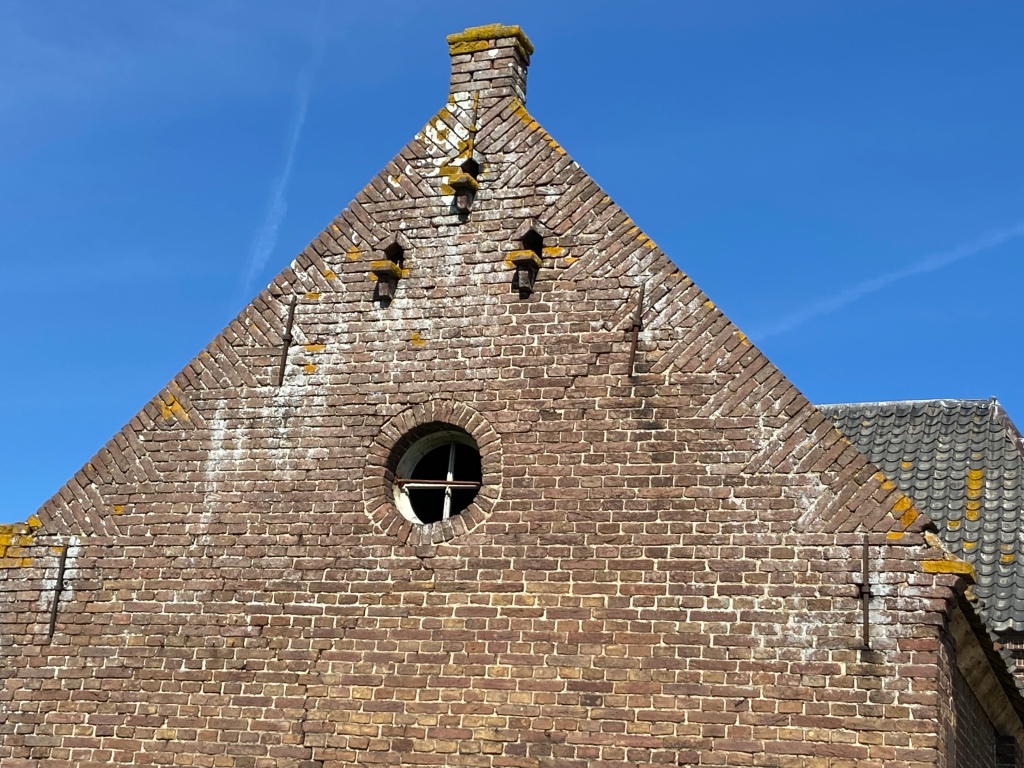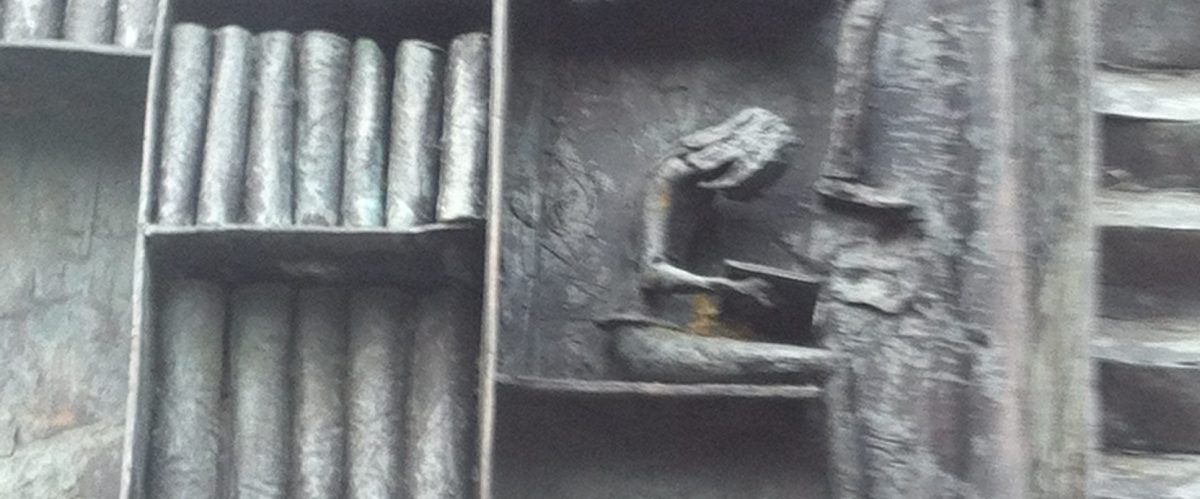Esteban’s “favourite painting was a huge canvas by an unknown Neapolitan master which confounded all the laws of plastic art by representing the apocalyptic immobilisation of a catastrophe. It was called ‘Explosion in a Cathedral’, this vision of a great colonnade shattering into fragments in midair—pausing a moment, as its lines broke, floating so as to fall better—before it dashed its tons of stone down on to the terrified people beneath.”
This painting is symbolic for everything that shatters during the events of Carpentier’s novel. It begins in Cuba on the eve of the French Revolution, which will have an explosive effect not only in France itself, but on its Caribbean colonies and the islands which trade with them. But for the family at the centre of this novel, the first shattering events are closer to home: the death of their father, the arrival of a mentor and a devastating hurricane.

When their father dies, the teenagers Carlos and Sofia are left in charge of the house and their sickly cousin Esteban. They shut the house up for the first year of mourning, ordering new furniture, then building labyrinths and mountains of unpacked packing cases. They avoid all contact with the outside world, leaving the Executor of their father’s estate to run their father’s import business and warehouses. They sleep during the day and, during their nighttime waking hours, they do entirely as they please, dropping all standards of decorum. Carlos uses mattresses to soundproof a room so that he can practice on his flute, as music is not socially acceptable during the first year of mourning. Everything continues in this way until they are rudely interrupted by a stranger hammering on their door: Victor Hugues. He has come to meet their father for business, but turns his attention to them once hears their father has died. He will entirely change their world.

On a nighttime coach ride to alleviate one of Esteban’s acute asthma attacks, Victor takes them to the teeming harbour area, full of sailors and prostitutes. This passage about the various nationalities amused me:
“Victor avoided the drunks with a coachman’s skill and seemed to be enjoying this squalid turmoil; he picked out the North Americans by their swaying gait, the English by their songs, the Spanish because they drank their wine out of wineskins and porrons.”
When Esteban has a particularly bad attack, Victor calls in the help of Doctor Ogé, whom he had met in Port au Prince in Haiti. Sofia is horrified at the idea of a Black man touching one of her relatives. Looking around, Ogé immediately remarks upon an ox-eye window in Esteban’s room. This is a term I didn’t know, but is a translation of the French oeil de boeuf, a round window that is commonly used in barns in the Netherlands. On the other side of this window, he identifies the cause of the asthmatic attacks, though his reasons are more folk medicine and observation than medical. The instant cure will also change their lives.

On the night of a hurricane, everything shifts. Ogé has disappeared, possibly arrested, and Victor is upset. He sets to, rescuing carpets and furniture from the flooding, commanding the workers to save the stock in the warehouse. But afterwards, he retires to Sofia’s bedroom, sleeps next to her in her bed without waking her, then attempts to rape her. She fights him off, but the night has changed her.
“The strangeness of everything, the violence of an event, which had jolted everyone out of their habits and routine, now helped to aggravate the countless, contradictory disturbances produced in Sofia, when she woke up, by the memory of what happened the night before. This formed part of the vast disorder in which the city had been plunged; it had integrated itself into the scene of the cataclysm. But there was one factor which outweighed in importance the collapse of walls, the destruction of belfries, the foundering of ships—she had been desired. This was so unusual, so unexpected, so disturbing, that she could not admit its reality. Within the space of a few hours she had emerged from adolescence, feeling that her body has matured in the presence of a man’s desire. He had looked on her as a woman, before she had looked on herself as a woman, or imagine that others might concede her the status of woman. ‘I am a woman,’ she murmured resentfully, as if weighed down by an enormous burden which had been placed on her shoulders, and she looked at herself in the mirror as if she were looking at someone else, someone different and beset by adversity, finding herself tall, ungainly, and insignificant, with those too-narrow hips, skinny arms, and the asymmetry of her breasts which, for the first time, made her feel angry about her figure. The world was full of perils. She was leaving a road free from dangers to take another—a testing road, where everyone would make comparisons between her real and her reflected selves, a road which one could not travel without harm and giddiness.“
Book serendipity: freemasonry
When Victor accuses the Executor, Don Cosme, of embezzling the orphans’ money, Cosme “suddenly stood up and barked a single word at Victor, which sounded in Sofia‘s ears like an explosion in a cathedral: ‘Freemason!’” Coincidentally, I have started reading an ARC in which freemasonry is central: Split by Alida Bremer, set in the former Yugoslavia before the second world war. In that book, too, a main character is a Freemason and a murder victim was on the verge of joining the lodge.
Accused of embezzlement, Don Cosme retorts to Victor with a counteraccusation about Freemasons:
“These are the men who pray to Lucifer; these are the men who insult Christ in Hebrew; these are the men who spit on the crucifix; these are the men who hold an abominable feast on the night of Holy Thursday, when they carve a lamb, crowned with thorns and laid face downwards on the table with nails through its feet. It was for this that the Holy Fathers Clement and Benedict excommunicated these infamous men, and condemned them to burn in hell-fire.”
Revolution
When Alejo Carpentier wrote this novel in 1962, revolution was in the air as Fidel Castro had overthrown Batista in Cuba in 1969. Although Carpentier was working for the State Publishing House as he completed Explosion in a Cathedral, the book has been described as a “meditation on the dangers inherent in all revolutions as they begin to confront the temptations of dictatorship.” (citation on Wikipedia of Colchie, Thomas (editor), A Hammock Beneath the Mangoes: stories from Latin America; Penguin Group, 416–417 (1991)).
“To talk revolutions, to imagine revolutions, to place oneself mentally in the midst of a revolution, is in small degree to become master of the world. Those who talk of revolutions find themselves driven to making them. It is so obvious that such and such a privilege must be abolished that they proceed to abolish it; it is so true that such, an such an oppression is detestable that measures are concerted against it; it is so apparent that such a such a person is a villain that he is unanimously condemned to death. Then, once the ground has been cleared, they proceed to build the City of the Future.”
Carpentier’s rich language
Carpentier’s descriptions are lush and vivid in general, but his descriptions of nature are particularly sublime. For instance, on a sea journey to Haiti:
“The Arrow was cleaving slowly through a vast migration of medusas, heading towards the shore. As she watched this multitude of ephemeral creatures, Sofia wondered at the continual destruction which was like a perpetual extravagance on the part of creation : the extravagance of multiplying only to suppress on a larger scale; the extravagance of engendering as much from the most elementary matrices as from the moulds which produced the men-gods, only to surrender the fruits to a world in a state of perpetual voracity. They came from the horizon in their lovely carnival costumes, these myriads of living things still suspended half- way between the vegetable and animal kingdoms—to be offered up in sacrifice to the sun.”
Sometimes the richness of Carpentier’s descriptions have a downside: for instance, when the sailors encounter sharks, an orgy of slaughter ensues and this is described equally vividly.
Translation woes?
Another aspect of the language, at least, in John Sturrock’s translation into English, is the use of obscure words. Without finding the original Spanish, it is difficult to assess if this is down to Carpentier (as I suspect), or direct translation of common Spanish words into similar English words that are scarcely used. And that could either be deliberate, to give a flavour of the Spanish, of it could be down to clunky translation. Assuming I’ve got the right one, Sturrock was a literary journalist, reviewer for the TLS and the LRB and most of the books attributed to him on Goodreads are either overviews of world literature or translations from French, not Spanish. One begins to wonder if he didn’t translate this from a French translation, rather than directly from the Spanish, but that doesn’t excuse him from using odd vocabulary if the original words were used commonly used in Spanish. Google even presented me with a preview of a blogpost entitled John Sturrock is an idiot because he misremembered a plot point in his introduction to the Penguin Classics edition of Victor Hugo’s Notre Dame de Paris, a book which he translated himself, so should have known inside out. He also expressed rather abhorrent views which seemed to condone rape as a means to an end. However, he was obviously a respected translator of French, being entrusted with such works as the aforementioned Notre Dame de Paris and the fourth volume of Proust, Sodom and Gomorrah; I had no idea my unopened two-volumes Proust held such a title! He was praised for his contemporary, readable translations from French, so I suppose I should trust his judgment for Explosions, rather than brand him an idiot.
These are my comments after only the first third of the book as I wanted to post for the 1962 Club, hosted by Karen and Simon, and I’m already late. There is an excellent Goodreads review of the book on Goodreads by someone calling themselves Samuel, if anyone is interested. I shall return to my reading and hope to share more comments later.
